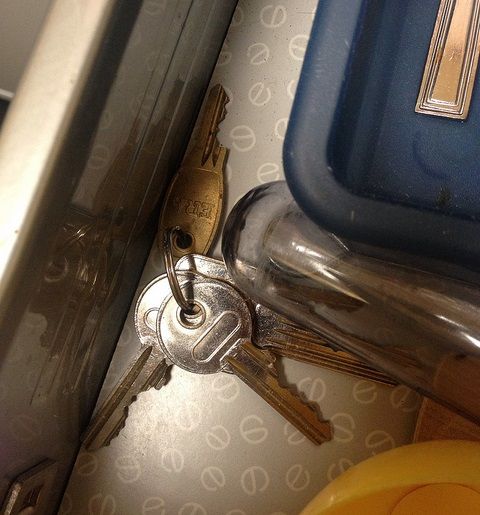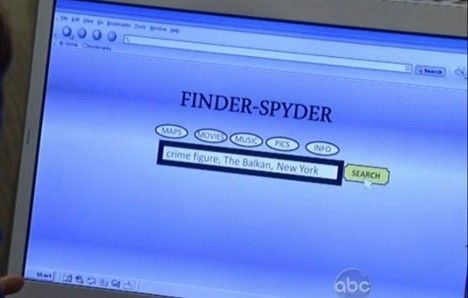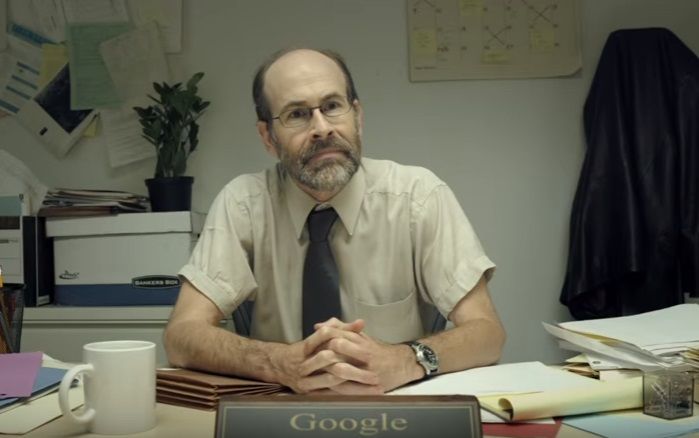With every new development in search technology, search engines are becoming more and more futuristic.
With voice search and digital assistants letting you talk to search engines, and natural language search turning searching into a conversation, real-life search engines increasingly resemble something we used to only see in sci-fi films.
But there are still so many things that we’d love to be able to search for, which are unfortunately beyond the bounds of what is physically possible. Here, then, are six sadly fictional search engines that we only wish existed.
Where The Hell Are My Keys?
We’ve all been there. You’re running late for an Important Event, and are just about to make a frantic dash out of the door when you realise you’re missing something vitally important.
 Photograph by Iain Farrell, made available via CC BY-ND 2.0
Photograph by Iain Farrell, made available via CC BY-ND 2.0
Where the hell are your keys? Or maybe it’s your work pass, Oyster card, wallet or something else equally indispensable that you can’t leave the house without. Whatever it is, this object always picks the absolute most inconvenient moment to play hide-and-seek around the house, causing you to waste another 15 minutes frantically emptying drawers and upending furniture until you realise it was in your damn pocket all along.
Wouldn’t it be so much easier if there were a specialised search engine dedicated to finding important objects you’ve mislaid? A two-second search, and boom. “They’re on the kitchen counter.” “It fell down the back of the sofa.” “They’re still on top of your head.” So much time saved, so many crises averted.
Bonus points if the search engine becomes more powerful the more frantic you are about finding what you’ve lost.
Lost Childhood Objects
Much like the ‘Where The Hell Are My Keys?’ search engine but more powerful, the Lost Childhood Objects search engine would be able to locate cherished childhood keepsakes from across the years that have been swallowed by the mists of time and that miniature Bermuda Triangle that lurks under your bathroom sink.
 Photograph by Jeffrey, made available via CC BY-ND 2.0
Photograph by Jeffrey, made available via CC BY-ND 2.0
From well-loved teddy bears to those rare Pokémon cards you hid and forgot about, the Lost Childhood Object search engine can find any old, beloved item that has since been misplaced. Simply enter the name and description of your Childhood Object, the year you last remember having it and the rough geographical area you lost it in, then let the search engine work its magic.
Just remember that it might not be in quite the same condition that you left it in.
Finder-Spyder
This one is an actual search engine… sort of. Finder-Spyder is the go-to search engine that characters in TV programmes from Bones and Breaking Bad to Dexter and The X-Files all rely on.
Presumably powered by a friendly rogue web crawler, Finder-Spyder is your search engine ex machina for every plot point that requires retrieving some bit of sensitive or private information. Walled gardens? No problem! Encrypted information? Not an issue! Security and ethical restrictions fall before Finder-Spyder’s mighty scuttle. It can even crawl the dark web!
The only limits to its abilities are television writers’ imaginations and the needs of whatever script the search engine is being written into. If this search engine existed, solving murders and supernatural mysteries would be a piece of cake.
If Fynder-Spyder isn’t your cup of tea, an intrepid fan has recreated the fictional search engine Chumhum from the TV series The Good Wife over at chumhum.co.uk – powered by DuckDuckGo. Alternatively, you can use the real fake search engine Querioo for your own film and TV purposes.
Memory retrieval
 Image by geralt via Pixabay
Image by geralt via Pixabay
If only our brains could be indexed and searched in the same way as the World Wide Web. How useful would that be? No more struggling to recall that one crucial piece of information, or wishing you could better recall the fantastic summer trip you went on five years ago.
It also works on ideas and dreams, so you don’t have to worry any more about forgetting that bolt of inspiration you had right before falling asleep (seriously, so annoying) or that fantastic dream you had during the night. Naturally, you can search with your thoughts, using a fleeting mental image or a vague recollection as search terms. Forget keywords, this search engine is pure user intent.
This would only be usable by the individual person, of course, or things start to become dangerously Inception-ish. Even handier would be if your mind functioned like a browser and you could delete its history to get rid of any unpleasant memories or nightmares. Or if you could enable Incognito Mode for things you really won’t want to remember later.
Google as a guy
If you’ve seen CollegeHumor’s ‘If Google was a guy’ video series, then you’ve probably imagined how hilarious it would be if Google really were a grumpy, balding, all-knowing bloke who side-eyes your X-rated searches, laughs at you for using Google Glass and makes fun of Siri.
Okay, so the wait to get into his office wouldn’t be all that fun, but it would be worth it to see him paint himself like Jackson Pollock, glare at the NSA for spying on searches, yell at vaccine conspiracy theorists and dorkily enthuse about the benefits of Google Plus.
And if the wait ever becomes too long, you can trot over to the perpetually unloved Bing, who makes up for what he lacks in accuracy with sheer earnestness (and a much nicer office).
 “Soon. They’ll come soon.”
“Soon. They’ll come soon.”
Snarky Comeback Search
If we can’t have a snarky Google, how about a snarky retort search engine? You’d never need to be lost for words again. With Snarky Comeback Search, you can enter the put-down you need to respond to and the search engine will trawl its vast index of comic quips, Shakespearean insults and ‘yo mama’ jokes for the best response. Or hit ‘I’m Feeling Lucky’ for a hilarious non-sequitur.
The Snarky Comeback algorithm ranks results by level of burn, and favours comebacks with creative metaphors and clever pop-culture references, while issuing penalties for clichés and responses that sound too petulant.
You can enable an ‘always listening’ mode, which uses voice search capabilities to detect when someone disses you and automatically search for a response, enabling on-the-spot snappy comebacks. Alternatively you can have the search engine’s digital assistant, Cortana, chirp the response for you in her sassy robotic voice.
The future of search, in a nutshell.
The article Six fictional search engines we wish existed was first seen from https://searchenginewatch.com



No comments:
Post a Comment